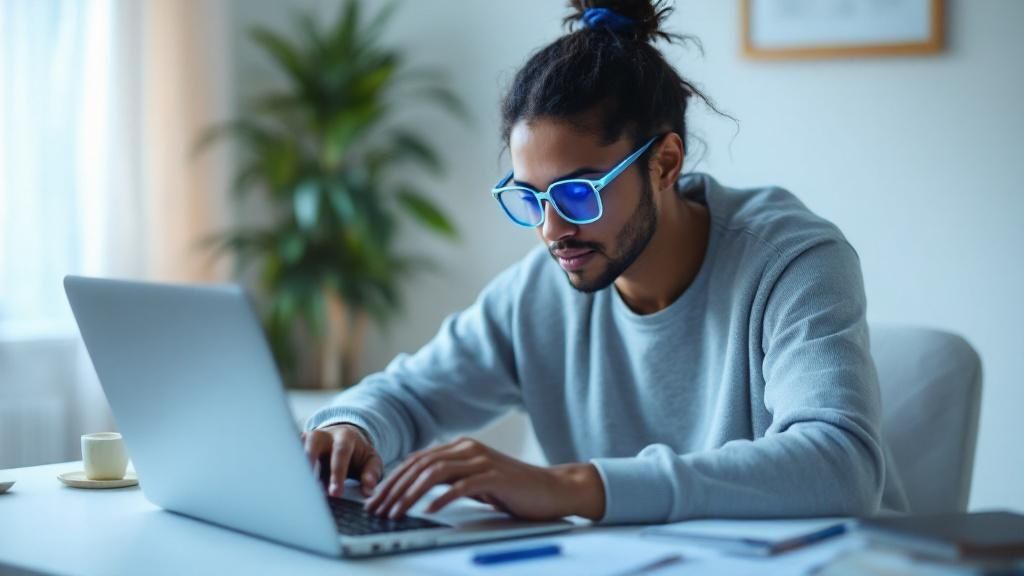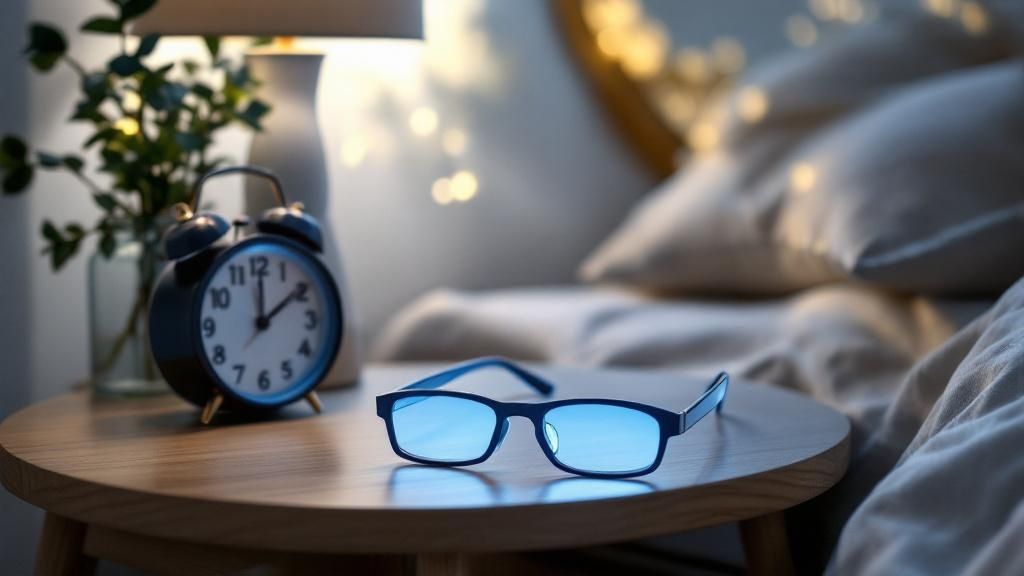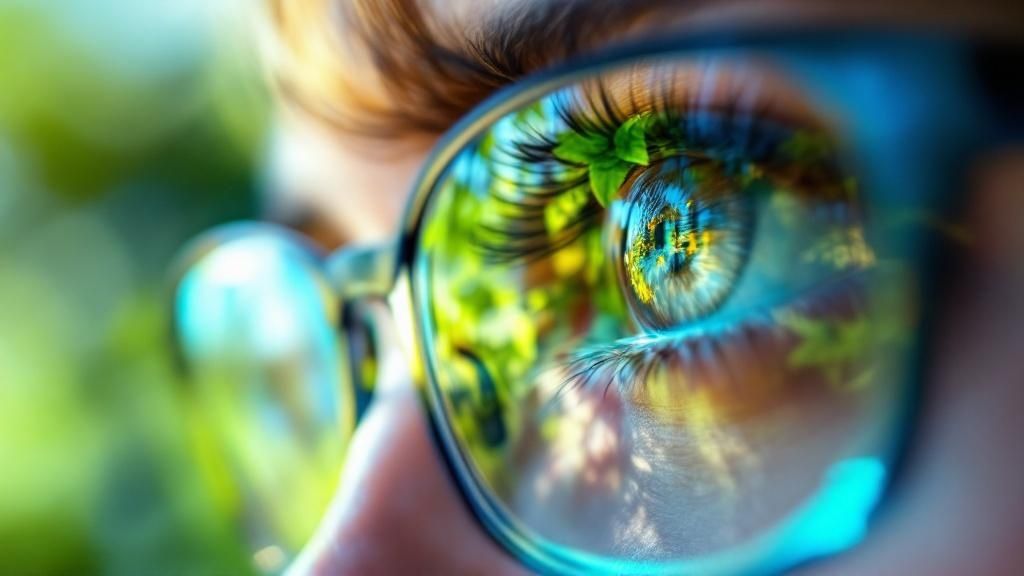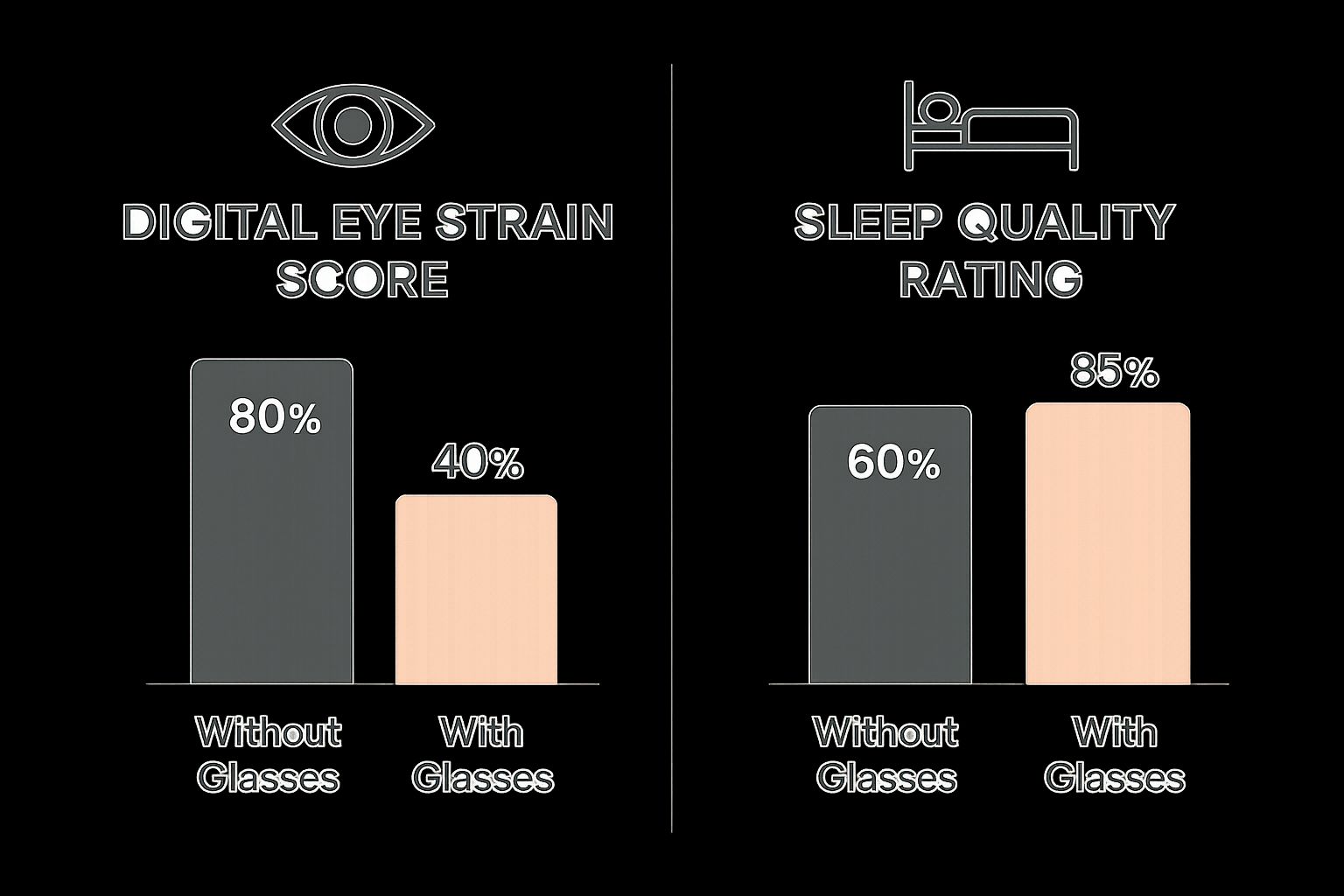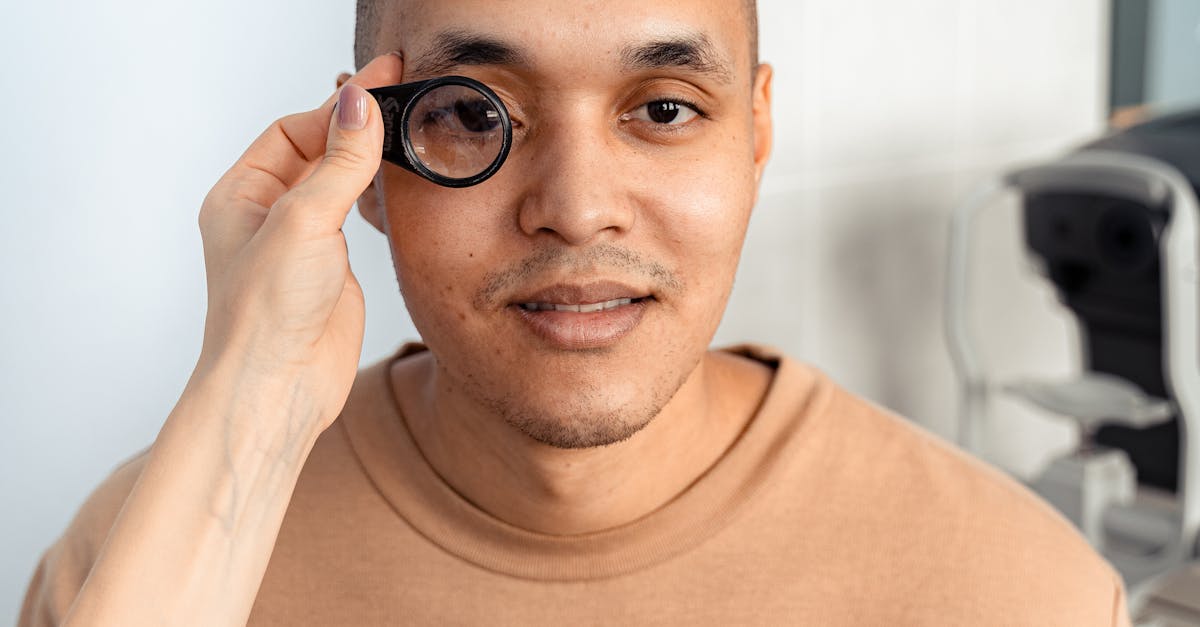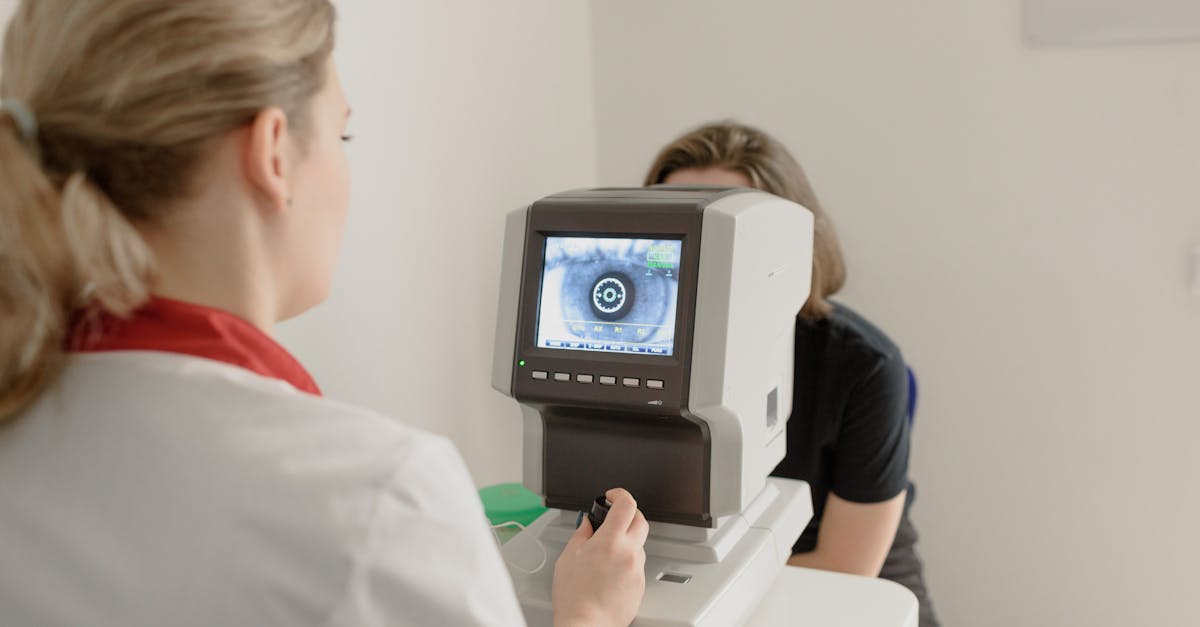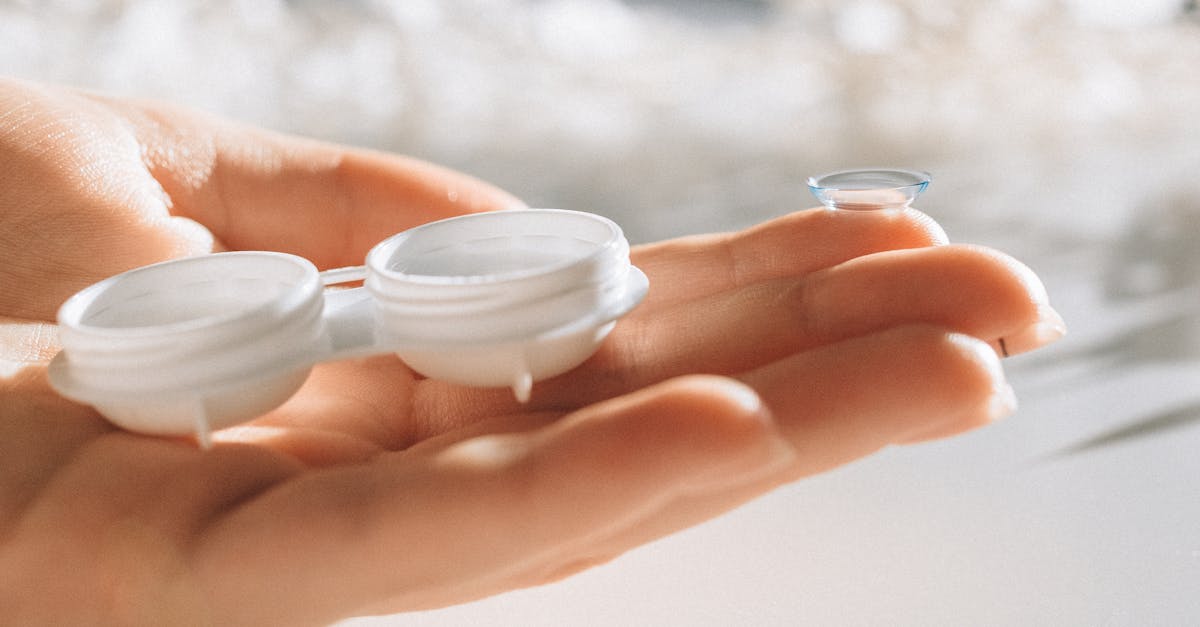If you spend a good chunk of your day staring at a screen, you've probably asked yourself if blue light glasses are just hype. The short answer? No, they really can make a difference. The main blue light glasses benefits boil down to less digital eye strain, fewer headaches, and better sleep. For anyone in Glendale Heights glued to a computer or phone, that makes them a modern-day essential. Here at iDoctor, we help patients from all over the area, including Bloomingdale and Carol Stream, find relief and comfort in their digital lives.
Why Blue Light Is a Growing Concern in Glendale Heights
Let's face it, our eyes are working overtime these days. Whether you're a professional in Carol Stream juggling emails or a student in Lombard logging into online classes, screens are a huge part of our lives. This non-stop exposure means our eyes are constantly flooded with high-energy visible (HEV) light, which most of us just call blue light.
Alt: A person wearing blue light glasses while working on a laptop, illustrating blue light glasses benefits in Glendale Heights.
Think of blue light as the espresso shot of the light spectrum—it's intense and its job is to keep you awake and alert. While the natural blue light from the sun is great for regulating our sleep-wake cycles, the artificial kind beaming from our screens is another story. It’s a constant, close-range stream that can seriously overstimulate our eyes and brain.
This is a quick summary of the primary advantages we will cover, giving you a fast overview of how they can help.
Quick Look at Blue Light Glasses Benefits
| Benefit | How It Helps Your Daily Life |
|---|---|
| Reduces Digital Eye Strain | Makes long hours on the computer feel less strenuous, preventing that tired, gritty feeling in your eyes. |
| Improves Sleep Quality | Helps your brain produce melatonin on schedule, making it easier to fall asleep and stay asleep. |
| Minimizes Headaches | Eases the tension and visual stress that often lead to screen-induced headaches. |
| Promotes Digital Wellness | Supports healthier screen habits by reducing the negative physical side effects of long-term digital device use. |
By understanding these key areas, you can see how a simple pair of glasses can have a noticeable impact on your comfort and well-being.
The Impact of Digital Screens
This persistent exposure is directly linked to the complaints we hear every day from patients at our Glendale Heights boutique. So many people come in with symptoms of digital eye strain and have no idea what’s causing it.
Sound familiar? It often shows up as:
- Tired, Aching Eyes: That heavy, fatigued feeling you get after a few hours of screen time.
- Difficulty Focusing: When your vision gets a bit blurry and your eyes struggle to stay sharp.
- Increased Headaches: A nagging, dull headache that seems to kick in during or after your workday.
- Disrupted Sleep: Using your phone or tablet before bed can fool your brain into thinking it's still daytime, making it much harder to wind down.
At iDoctor, we see this firsthand. Patients from Bloomingdale and the surrounding towns are constantly looking for relief from screen-related discomfort. They need a practical solution that fits into their life, whether it's for an office job, schoolwork, or just scrolling at home.
So, how do the glasses help? They work by filtering out a portion of this intense blue light before it ever hits your eyes, kind of like how sunglasses block UV rays. By cutting down on this "digital noise," the glasses give your eyes a much-needed break. They act as a shield, simply making your screen time more comfortable. This is a separate but complementary feature to other lens treatments, a topic we explore more in our guide on the benefits of anti-glare glasses.
How Blue Light Disrupts Your Eyes and Sleep
Let's get straight to the science of blue light, but without the confusing jargon. Think of the light around us as a full spectrum of colors, each with its own energy level. Blue light is the high-energy shot in that spectrum—like a jolt of espresso. It has a very short wavelength that’s fantastic at keeping you alert and focused.
Alt: Diagram showing the visible light spectrum and how blue light affects the eye, a key concept for understanding blue light glasses benefits.
The sun gives us a healthy, natural dose of blue light that helps set our internal clocks for the day. The problem starts when we get a constant, up-close blast of it from our screens. For professionals and students in Addison and Glen Ellyn who are glued to devices for work and school, this constant exposure is where the trouble begins.
Because blue light’s wavelengths are so short, they scatter more easily than other colors. This scattering creates a kind of visual "static" or glare, forcing your eyes to work harder just to focus. The result? That all-too-familiar feeling of digital eye strain.
The Melatonin Connection
The disruption doesn't just end with tired eyes. The biggest issue with artificial blue light, especially after dark, is its impact on your sleep. Your brain runs on an internal 24-hour clock called the circadian rhythm, which is in charge of your sleep-wake cycle.
A crucial hormone in this cycle is melatonin, which basically signals to your body that it's time for bed.
Your brain is hardwired to connect darkness with sleep. When you stare at your phone or laptop late into the evening, that bright blue light fools your brain into thinking it's still daytime. This suppresses melatonin production and throws your entire internal clock out of whack.
This is exactly why you can be physically exhausted but find yourself scrolling in bed, feeling wide awake. It's one of the most common complaints we hear from our patients. You can dive deeper into this as we answer the question of do blue light glasses work in a dedicated article.
What Does This Disruption Feel Like?
This mismatch between your brain's expectations and your digital environment can cause a cascade of noticeable problems. Most people don't just experience one symptom, but a frustrating combination.
- Difficulty Falling Asleep: You're in bed, tired but weirdly alert, unable to shut your mind off.
- Poor Sleep Quality: Even after you finally drift off, the lack of melatonin can result in lighter, less refreshing sleep.
- Daytime Grogginess: Waking up feeling like you barely slept is a classic sign of this disruption.
- Increased Eye Strain: The visual static from blue light adds to that gritty, achy feeling in your eyes after a long day staring at screens.
As we rely more on our digital devices, our exposure to this disruptive light only increases. This growing awareness is why the global market for blue light blocking glasses is projected to hit nearly $6 billion by 2035, a trend fueled by our screen-heavy lifestyles. This isn't just a niche product anymore; it's a mainstream response to a modern problem.
Easing Digital Eye Strain and Fatigue for Patients Near Villa Park
One of the first things people notice when they start wearing blue light glasses is a real sense of relief from eye strain. If you’ve ever finished a long day at the computer with tired, achy, or dry eyes, you know exactly what we’re talking about. This is classic digital eye strain, also known as Computer Vision Syndrome, and for many of us in communities like Villa Park and Roselle, it's just part of the daily grind.
Alt: Professional at iDoctor boutique helping a patient choose designer eyeglasses in Glendale Heights.
The intense, high-energy visible (HEV) light beaming from our screens is a bit like visual static. It forces the tiny focusing muscles inside your eyes to work constantly to keep things sharp, which leads directly to that feeling of fatigue. Blue light filtering lenses essentially act like shock absorbers for your eyes, taking the edge off that harsh light before it has a chance to wear you out.
This reduction in visual stress can make a huge difference in your day-to-day comfort. And it's not just for people who already have prescription glasses—anyone spending significant time on a computer, tablet, or phone can feel the benefit. It's a simple change that can make your screen time much more comfortable.
What Does Eye Strain Feel Like?
Digital eye strain isn't just a single feeling; it's a whole collection of frustrating symptoms. After a few hours staring at a screen, you might notice a combination of these issues:
- Tired, heavy, or aching eyes
- Struggling to keep your eyes open
- Vision that seems blurry or goes in and out of focus
- Headaches that cluster around your temples or feel like they're behind your eyes
- Eyes that feel dry and gritty, or that water excessively
By filtering out a key portion of the most intense light waves, blue light glasses give your eyes a chance to relax, even while you’re focused on the task at hand. This gets right to the root of what's causing the discomfort in the first place.
Think of it like putting on a pair of noise-canceling headphones in a busy cafe. The headphones don’t alter the conversation you’re trying to have, but they cut out all the distracting clatter around you, making it clearer and far less draining. Blue light glasses offer a similar effect for your vision.
It's also worth remembering that while blue light glasses are a fantastic tool, persistent eye strain can sometimes point to other vision issues. If your symptoms just won't quit, we always suggest scheduling one of our detailed eye exams in Glendale Heights. A thorough, professional check-up can rule out underlying problems and ensure you're getting the right support. You can read more about finding relief in our post on digital eye strain treatment.
At the end of the day, the goal is to make your digital life more sustainable. By easing eye strain, you can stay focused on your work, enjoy your screen time without paying for it later, and finish the day without feeling so visually exhausted.
Reclaiming Your Natural Sleep Cycle
Beyond just giving your eyes a break, one of the most significant benefits of blue light glasses is their ability to help you get back to the deep, restorative sleep you’re meant to have.
Have you ever found yourself scrolling on your phone in bed, feeling exhausted but somehow wide awake? That’s the disruptive power of blue light at work. It throws a wrench directly into your body's internal clock, what's known as your circadian rhythm.
Your brain follows an ancient, simple script: when the sun goes down, it’s time to release melatonin, the hormone that tells your body it's time for sleep. But the bright, artificial blue light beaming from our screens at night sends a conflicting message. Your brain sees that light, thinks it's still daytime, and slams the brakes on melatonin production. This leaves you feeling alert and wired right when you should be winding down.
Creating a Digital Sunset
This is where blue light glasses really prove their worth. By popping on a pair for a couple of hours before you plan to go to sleep, you’re essentially creating a “digital sunset” for your brain. The lenses filter out the specific wavelengths of light that halt melatonin, giving your body the signal that evening has arrived and it's okay to start preparing for rest.
This small habit allows your body to produce melatonin on its natural schedule. The result? It becomes much easier to fall asleep, stay asleep, and wake up feeling truly refreshed. It's a simple adjustment that can make a world of difference in your daily energy and overall well-being, a common goal for many of our patients from Schaumburg and Wheaton.
Take one of our patients from Wheaton, for example. She works late on her laptop and used to finish her day only to toss and turn for an hour, her mind still racing. After picking up a pair of blue light glasses from our Glendale Heights boutique, she started wearing them after dinner. Within a week, she told us she was falling asleep faster and waking up with more energy—all because she gave her brain the right cues to power down.
The Science of Better Sleep
The link between blue light and sleep isn’t just an idea; it’s baked into our biology. Study after study has shown that exposure to blue light in the evening can seriously delay the release of melatonin. By blocking this specific light, you're no longer fighting against your body's natural processes—you're working with them.
Here are a few key improvements you can expect:
- Falling Asleep Faster: You'll spend less time staring at the ceiling when your body is actually producing the sleep hormones it needs at the right time.
- Deeper, More Restorative Sleep: Melatonin doesn't just help you doze off; it plays a crucial role in the quality and depth of your sleep cycles.
- Waking Up Refreshed: When your sleep cycle is properly aligned, you’re far more likely to wake up feeling rested and ready for the day ahead.
For anyone living in nearby communities like Wheaton, taking back your sleep cycle is a huge step toward better health. By simply managing your light exposure in the hours before bed, you give your body the permission it needs to do what it does best: rest and recover.
Choosing the Right Blue Light Glasses for You
Alright, so you're sold on the benefits of blue light glasses. That's great! The next step, however, can feel a bit overwhelming. A quick search reveals a ton of options, and let's be honest, they are not all created equal. Finding the right pair for your needs, whether you're in Bloomingdale or a neighboring town, is key to actually getting the results you're after—be it less eye strain or a better night's sleep.
Think of it like buying sunscreen. You wouldn't use the same light SPF 15 for a full day at the beach that you'd use for a quick walk to your car. Blue light lenses work in a similar way; they come in different "strengths" for different situations.
Comparing Lens Types for Your Lifestyle
To help you choose the right blue light filtering lens for your daily needs, here's a straightforward comparison.
| Lens Type | Best For | Blue Light Blockage | Appearance |
|---|---|---|---|
| Clear Lenses | All-day office use, general screen time, professionals needing true color perception. | Filters a smaller, targeted portion of the highest-energy blue light. | Virtually unnoticeable tint. Looks like a standard lens. |
| Amber/Yellow Lenses | Evening and nighttime use, 2-3 hours before bed, for those serious about sleep quality. | Blocks a much higher percentage of blue light across a wider spectrum. | Noticeable yellow or amber tint. |
Choosing the right lens really depends on your main goal. For professionals in Medinah who spend hours on video calls and need to see colors accurately, clear lenses are the perfect tool for reducing eye strain without getting in the way. But if your primary concern is sleep, those stronger, amber-tinted lenses are your best friend for evening wear.
Alt: A pair of stylish Tom Ford designer eyeglasses available at iDoctor in Glendale Heights, IL.
As you can see, the data speaks for itself. Using the right glasses makes a measurable difference in both eye comfort and sleep.
Why a Professional Fitting in Glendale Heights Matters
It’s tempting, I know. You see a cheap pair of blue light glasses online and think, "Why not?" But there’s a world of difference between a generic, one-size-fits-all product and a professionally fitted pair from iDoctor. The market for these glasses is booming—North America alone accounts for about 37.85% of the global $2.6 billion industry, so there are a lot of low-quality options out there.
A professional fitting ensures the frame sits correctly on your face, the lenses are perfectly centered over your pupils for optimal clarity, and any prescription needs are flawlessly integrated. This is especially important for our clients from Itasca and nearby towns who value both precision and style.
Our expert opticians are here to guide you through our curated collection. We carry everything from iconic luxury brands like Tom Ford, Cartier, and Prada to stylish and accessible options from Ray-Ban. We'll make sure the pair you choose not only delivers maximum blue light protection but also feels great and fits your personal style.
For more tips on looking sharp on camera, check out our guide on choosing eyeglasses for Zoom meetings. At iDoctor, you're not just buying glasses; you're getting a solution that’s truly designed for your visual health and digital life.
Your Partner in Vision Health in Glendale Heights
So, let's bring it all together. The real-world benefits of blue light glasses are pretty clear: they can seriously cut down on eye strain, help you get back to a more natural sleep cycle, and just make your screen-filled days a lot more comfortable.
In a world where we're constantly glued to our devices, taking proactive steps for our eye health isn't just a good idea—it's essential. Think of it as a necessary investment in your long-term well-being. We're proud to be a trusted local partner in that journey for our neighbors here in Glendale Heights and the nearby communities of Hanover Park and Streamwood.
Of course, glasses are just one piece of the puzzle. Regular check-ups are absolutely crucial for maintaining healthy vision, but many people aren't sure how often they should get an eye exam.
We'd love to help you figure it all out. Come on down to iDoctor for a consultation. Our warm and professional team is here to answer your questions and help you find the perfect eyewear—from luxury brands like Gucci and Saint Laurent to affordable classics like Kate Spade—to protect your vision for years to come.
FAQ: Your Blue Light Questions Answered
Here are a few of the most common questions we get from patients at our Glendale Heights office.
Do I need an eye exam before buying blue light glasses in Glendale Heights?
That’s a great question. While you can certainly find non-prescription blue light glasses, we strongly encourage you to book one of our detailed eye exams in Glendale Heights first. An exam is the only way to be sure that an underlying vision problem isn't the real cause of your headaches or eye fatigue. Patients from Carol Stream and Lombard often tell us how much better a professionally fitted pair feels and works compared to an off-the-shelf solution.
Can I get a blue light filter on my designer eyeglasses?
Yes, absolutely! Adding a high-quality blue light filter to your prescription lenses is one of the smartest and most popular upgrades we offer here at iDoctor. This protective coating can be applied to nearly any lens type, whether you wear single-vision glasses or progressives. It’s the best of both worlds—you get the sharp, clear vision you need, plus protection from digital eye strain, all in one pair of glasses. We can add this feature to any of our frames, so you don't have to choose between protection and your favorite style, whether it's Gucci, Cartier, or a timeless pair of Ray-Bans.
Are blue light lenses covered by my vision insurance?
In many cases, yes. Most major vision insurance plans offer some level of coverage for lens enhancements like blue light filtering. At iDoctor, we accept all major vision insurance plans. Our team has years of experience working with providers and can help you understand your benefits. When you come into our Glendale Heights boutique, we’ll happily walk you through your plan to help you get the most out of it and make your new glasses as affordable as possible.
Ready to feel the difference for yourself? Visit iDoctor for a personalized consultation and check out our hand-picked collection of designer and affordable eyewear. Schedule your visit today at iDoctorIL.com.


